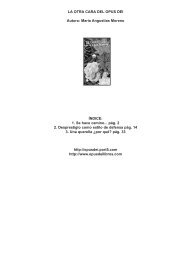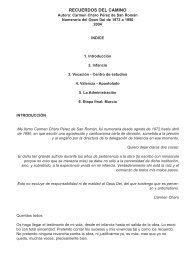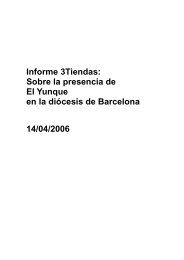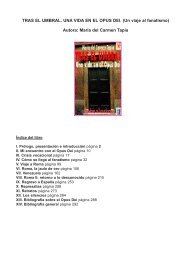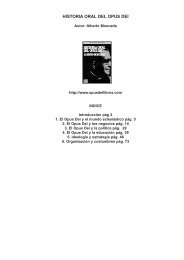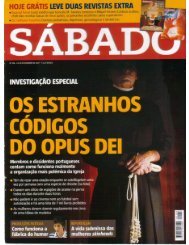You also want an ePaper? Increase the reach of your titles
YUMPU automatically turns print PDFs into web optimized ePapers that Google loves.
In these individual reports, regularly updated from the different regions, everything, even the mosttrivial detail, is registered, including the personal likes and dislikes and the specific idiosyncrasies orpeculiar features of each Bishop. But the most telling about such reports are the judgment made abouteach person, evaluating even their Catholic “orthodoxy.” These opinions are then circulated in closedcircuits around the world. Everything is expressed using a special code, some of whose expressions aregathered in the ultra-secret volume called Augustinus. There, it is specified, for example, that in suchreports a member of the Hierarchy of the Church should be referred to as a colleague of Leo, that is,as a “colleague” of “Leo(poldo) Eijo y Garay.” 23 The reading of other volumes like the Vademécumdel Gobierno Regional of November 28, 2000, reserved for the Delegations and Commissions, is notjust shameful but actually scandalous, because of the immoral behavior it promotes, entirely contraryto the doctrine and canonical praxis of the Church.Therefore, in the goal of acquiring the “personal Prelature” status, they knew and they know whatthey were seeking and wanted. Was it to guarantee the secularity of the charism? Nowadays this ishard to believe: it was rather to obtain guarantees of “independence” within the fold of the Church.In this way, nobody would be able to monitor “their customs” from the inside, requesting an account,nor question the “divinization” of such customs as a way of subjugating the consciences. This is thereason behind their current efforts to interpret the granted “personal Prelature” status as somethinganalogous to Particular Churches, ignoring the last modifications introduced by John Paul II aboutthis canonical formula when he approved the Codex Iuris Canonici of 1983. It is also the reason behindtheir interest in theologically conflating the “natures” of <strong>Opus</strong> <strong>Dei</strong> and the Church by defining theirPrelature as a “hierarchical structure.”16. The universal canonical discipline is clear and known to all. It is impossible to entertain anydoubts about its clear purpose of safeguarding the most fundamental rights of the faithful regardingtheir freedom and their legitimate moral autonomy (see Veritatis Splendor, numbers 38-41). In spiteof all this, <strong>Opus</strong> <strong>Dei</strong> has violated these canonical norms: from its beginnings, when canon 530 of theCode of 1917 was in force; now with the current canon 630; and always by violating the permanentbinding force of the Decree Quemadmodum of Leo XIII.In <strong>Opus</strong> <strong>Dei</strong>, the faithful are not allowed to freely choose their own spiritual director or counselor,since that person is always appointed from above: the Director of a Center for his own subjects —precisely because of his position as “Director” in the government of the institution— or the persondesignated by the Director. The reason given nowadays to follow this praxis, so contrary to the canonsof the Church, is that it is a way to preserve the “good spirit” received from the Founder, who establishedit. According to the already-mentioned number 215 of the Catecismo de la Obra (Catechism of <strong>Opus</strong><strong>Dei</strong>) their good spirit moves them to have spiritual direction with the local male or female Director, andwith the priest designated to take care of each Center. That is, the “foundational charism” is invokedas an excuse to violate a canonical precept and an ecclesiastical practice of the deepest importance,since it is rooted in the demands of natural law.This praxis is justified in the book Experiencias sobre el modo de llevar charlas fraternasin the following terms: 24 The first members of <strong>Opus</strong> <strong>Dei</strong> adopted with complete freedom the custom of23 Translator’s Note: Eijo y Garay was Archbishop of Madrid in the 1940s and a great benefactor of <strong>Opus</strong> <strong>Dei</strong>. Hegranted the first approval of <strong>Opus</strong> <strong>Dei</strong> as Pious Union in 1941. At Escriva’s request he decreed that the FoundationalStatutes should be kept secret, locked in the Secret Archive of the Madrid Archdiocese, where they still remain. The textof these secret Statutes has been recently published in the opuslibros.org web site. It contains disturbing statementssuch as the following: (1) <strong>Opus</strong> <strong>Dei</strong> members “ejercitan ordinariamente el apostolado desde los cargos oficiales de laadministración pública” (usually carry out their apostolates from official positions in the Government’s Administration)(Article 1.2), the Government of the dictator Generalísimo Francisco Franco, in which some members of <strong>Opus</strong> <strong>Dei</strong> occupiedtop ministerial positions in the 1950s, 60s, and 70s, (2) “no podrán ser recibidos en la Obra quienes no tengan en suascendencia inmediata tres generaciones de católicos, siquiera por una de las ramas paterna o materna” (those nothaving at least three generations of Catholic ancestors in their father’s or mother’s line cannot be admitted in <strong>Opus</strong> <strong>Dei</strong>)(Article 5.2) and (3) “tampoco podrán ser admitidos quienes hayan recibido el bautismo siendo adultos” (those baptizedas adults cannot be admitted either) (Article 5.3). Note that these are the first Statutes of an institution that the Founderinsistently claimed was of divine inspiration from its inception.24 The original Spanish text reads as follows: Los primeros tomaron voluntariamente —libérrimamente— la costumbrede contar a nuestro Padre todas sus cosas, de abrir la conciencia de par en par. Después, cuando el desarrollo dela labor apostólica hizo que resultase físicamente imposible que pudiera escucharles personalmente, comenzaron a abrirsu alma al Director, con la misma visión sobrenatural, con la misma sencillez y confianza con que hablaban a nuestroFundador. And continues: Desde entonces, todos los fieles del <strong>Opus</strong> <strong>Dei</strong> somos conscientes de que la charla fraterna esun medio sobrenatural, dispuesto por el Señor para nuestra santificacin en el mundo: los Directores son instrumentos deDios, y cuentan con las gracias convenientes para ayudarnos; por tanto, acudimos siempre con disposiciones de completasinceridad, con el deseo de que sea cada vez más claro, más pleno, más íntimo el conocimiento que tienen de nuestra12


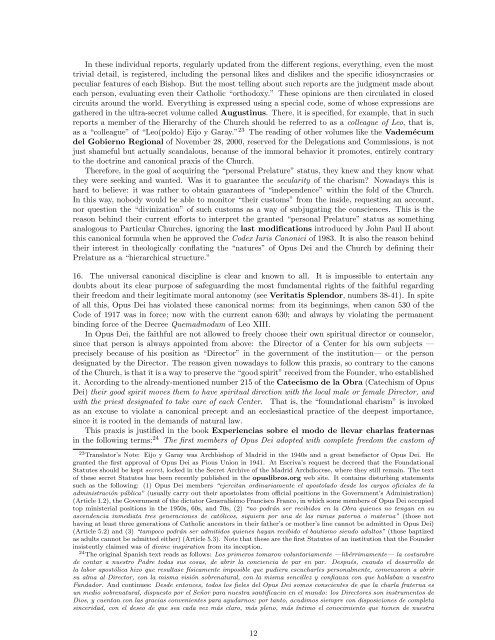
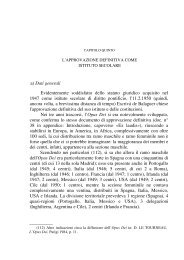
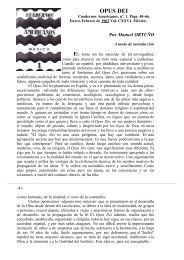
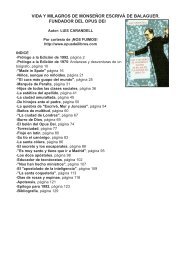
![Opus Dei Anexo A Una Historia [pdf].](https://img.yumpu.com/14295645/1/184x260/opus-dei-anexo-a-una-historia-pdf.jpg?quality=85)
